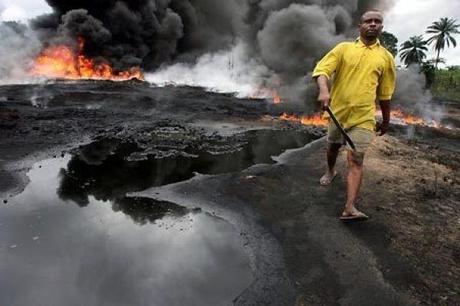
Cross Posted from Financial Times
By Ajay Makan
According to Nigerian parlour talk, Bukola Saraki is a man with presidential ambitions. Little surprise then that the senator, a former governor of the western state of Kwara, has seized on the issue of oil spills.
The oil industry’s dismal environmental record has helped fuel militancy, separatism and, more recently, rampant theft in the Niger delta.
By proposing legislation to deal with the question of spills, Mr Saraki is the latest in a line of Nigerians to take on the industry.
As he makes regular trips to affected areas, he is increasingly well known outside his home community. “I don’t know if he wants to be president, but it will be a good thing for Nigeria if he is,” says Kingsley Amaku, the senator’s senior legislative aide, who is spearheading his bill.
The legislation would significantly increase fines on companies responsible for oil spills. Those fines, and a levy on the industry generally, would lead to a trust fund that would contribute towards cleaning up and paying compensation.
The bill foresees better staffing and funding for the government regulator, which is renowned for its lack of punch.
Mr Saraki’s legislation is the latest instalment in a debate about the costs and benefits of hosting one of the world’s largest oil industries. The real question is whether international oil companies are the primary victims of spills, or if they are, in part, responsible.
Critics such as Mr Saraki accept that most spills are a result of sabotage but they say the companies do not do enough to prevent theft in the first place. “We believe a lot of spills that are blamed on third parties are a result of negligence of the operators to take pre-emptive steps to avoid [theft],” the senator says.
The question of what oil companies can be reasonably expected to do to prevent theft-related spills is a legal as well as a political controversy. In January, a court in the Netherlands ordered Royal Dutch Shell’s Nigerian subsidiary, Shell Petroleum Development Company of Nigeria, tocompensate a farmer after his land was polluted by oil from an abandoned well.
While the court accepted the spills were a result of sabotage and that SPDC had cleaned up the sites despite not being responsible, it found that the company could have prevented the sabotage by putting a concrete plug in the well, which it did not do until after the event.
Oil companies protest that they take many steps to prevent sabotage. SPDC has 600 contracts with local residents to patrol its pipelines. It is considering installing fibre optic technology so that it can “see” attacks on its pipeline as soundwaves and respond more quickly. The company has lent early support to “Stop the Theft”, a campaign group that has made theft a point of international debate, prompting offers of assistance from David Cameron, the British prime minister, and a place on G8 agendas.
For the campaign group, combating sabotage, rather than new legislation, holds the key. A first step would be better data and more trust between industry, communities and the government.
“Nigeria doesn’t know how much oil it is producing, let alone how much is being stolen or spilled,” says Patrick Dele Cole, leader of the campaign.
Many expect Mr Saraki’s bill to fall by the wayside. It would require the petroleum ministry to cede power to a new regulatory body, something the powerful bureaucracy is unlikely to do willingly. It is yet another sign of the adversarial relationship between industry and politics that does not bode well for hopes for significantly increased output.
“Oil companies cannot be deemed responsible for the environmental damage caused by third parties,” says one executive. “The only way to avoid spills [due to bunkering] is to not produce at all. You shut down production and don’t start it again.”

